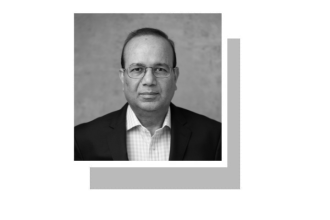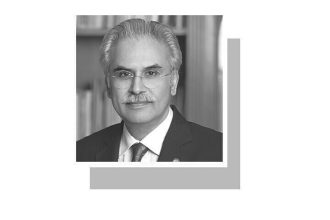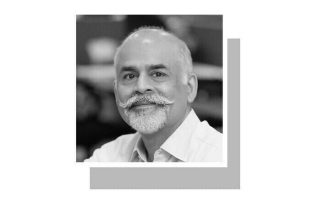LAST month, I travelled through Pakistan’s four provinces to oversee UNFPA projects and initiatives. I also engaged with partners to get their perspectives on development amid the recent geopolitical and funding challenges. During these visits, I connected with various partners, officials and intellectuals. One particularly moving — and painful — conversation was with Sania, an exceptionally talented 18-year-old from a remote village.
Reflecting on her brief life journey, Sania shared some of her memories etched in her mind. She recalled how, as a 10-year-old, she stood silently, looking into the eyes of those around her, searching for reassurance and safety.
At that tender age, Saniya found herself on the cusp of adolescence, confronting the threat of child marriage, poverty and detrimental traditional practices. She vividly remembers the fear and uncertainty that surrounded her, along with the question that echoed in her mind: would her guardians and the people around her allow her to finish her education and pursue her dream of becoming a journalist or TV presenter, or would harsh barriers destroy her opportunities before she even had a chance to start?
As Sania continued her story, I listened closely, yet my thoughts transcended geography and history, as I focused on the words attributed to Africa’s icon of freedom, tolerance and peace, Nelson Mandela: “Corruption is not only the theft of public money but also the theft of people’s dreams and their future.”
Child marriage destroys dreams and futures.
That question, that fear, is not solely Sania’s. It resonates with millions of girls around the globe whose dreams and futures are at risk simply due to their gender. Narratives like Sania’s have motivated me and numerous other development practitioners at UNFPA, along with other UN and civil society organisations, to commit our time and efforts to championing the rights of girls.
Throughout my career, first in Palestine and thereafter in the UN, I strived alongside many professionals and practitioners to transform the image of a young girl standing alone, vulnerable yet brimming with potential, into a powerful call for change — a change that should have occurred long ago to prevent the theft of our girls’ dreams and futures in the name of social norms, religion and patriarchy.
It all hinges on our interpretation of inherited culture, which does not always align with the divine message conveyed through the prophets and saints. We made that image the cornerstone of our mission: to advocate fiercely for the right of every girl to live a safe, healthy and dignified life. Because behind every statistic is a child with dreams, a voice and limitless potential — a child who might change the future of a nation, in fact, the world. Now more than ever, we must listen — and we must act.
Girls like Sania should never have to wonder whether they will survive adolescence with their rights intact. They should not have to choose between safety and education — or between survival and dignity. A 2020 UNFPA-led study on the political economy of child marriage identified multiple drivers of the latter, ranging from poverty and harmful social norms to religious misinterpretation, as well as weak institutional systems and legal framework and the latter’s enforcement.
We all have a role to play; change must begin at home with individual commitment. But communities, and governments, must unite to end child marriage, eliminate harmful practices and invest in education and healthcare for girls. Because when we protect a girl’s rights, we don’t just change her life — we change the future. Let us ensure that no girl stands alone in fear. Let us be the answer to her unspoken question. Let us be the force that enables her agency and voice, her opportunities, her hope. Child marriage is a crime because it steals dreams and destroys futures. It suppresses hope and denies a girl her freedom to choose what she wants to be in the future.
In a country like Pakistan, the prevalence of gender-based violence, child marriage and abuse is alarming. It is crucial to recognise that the key to a prosperous future may lie within one of these underprivileged girls — a girl who could rise as a leader capable of transforming the future of the nation and tackling its numerous challenges.
We must not replicate the actions of the pharaoh, who sought to extinguish hope by ordering the killing of children during the time of Moses. Our interpretation of culture, social norms and faith should never become a justification for quashing dreams or erasing futures. As guardians, thought leaders, politicians and practitioners, we cannot foresee how or where our Lord may choose to bestow His blessings. Indeed, we often remind ourselves that God may place His wisdom or secret in His weakest creations.
The writer is UNFPA representative in Pakistan.
Published in Dawn, August 22nd, 2025










